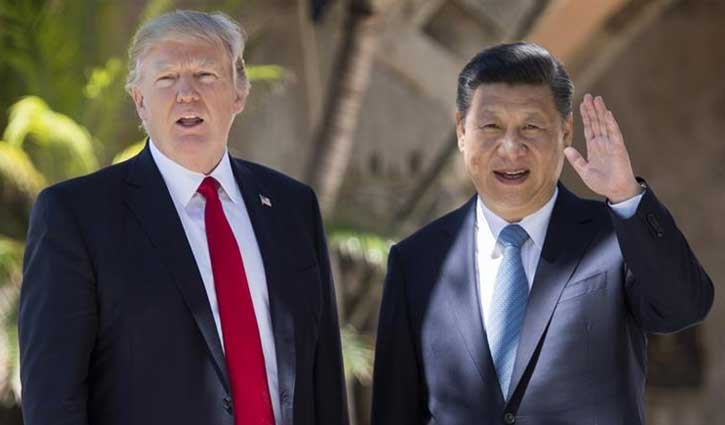Xi urges restraint on N. Korea in call with Trump
5 || risingbd.com

President Donald J. Trump (left) and and his Chinese counterpart Xi Jinping
International Desk: President Donald J. Trump and his Chinese counterpart, Xi Jinping, discussed growing tensions over North Korea’s advancing nuclear arms program, with Mr. Xi urging Mr. Trump to show restraint despite signs that the North may be preparing a nuclear test.
The phone conversation, on Monday morning in Beijing, came after Mr. Trump had already used a meeting with Mr. Xi in Florida, a follow-up phone call, interviews and Twitter messages to press Mr. Xi to do more to deter North Korea from holding additional nuclear and missile tests. The United States and its allies have also been on alert for another atomic test by the North.
In the latest call, the third between the two leaders, Mr. Xi told Mr. Trump that China opposed any such test by North Korea, but he also nudged Mr. Trump to show restraint, according to a report on Chinese television.
“China adamantly opposes any actions in contravention of the United Nations Security Council resolutions,” Mr. Xi said, according to the report, evidently referring to a series of decisions by the council to punish North Korea for its nuclear and missile programs.
“At the same time, it is hoped that all sides exercise restraint and avoid doing things that exacerbate tensions on the peninsula,” Mr. Xi said, referring to the Korean Peninsula. “Only if all sides live up to their responsibilities and come together from different directions can the nuclear issue on the peninsula be resolved as quickly as possible.”
The comments reflected growing Chinese fears that the tensions between North Korea and the United States and its Asian allies could spiral into outright military conflict. That widening rift is presenting China with hard choices between its longstanding ties to North Korea and its hopes for steady relations with the United States.
On Sunday, Japanese defense forces began a joint drill with a visiting United States Navy strike group featuring an aircraft carrier, the Carl Vinson, which had arrived in northeast Asia in a display of American resolve.
Mr. Trump had said this month that the Carl Vinson was part of an “armada” of American Navy ships that would move closer to North Korea as a warning against provocative actions. It turned out the Carl Vinson was headed nowhere near the Korean Peninsula, but the carrier and accompanying ships have moved into the region, prompting warnings of a retaliatory strike from North Korea.
The South Korean Defense Ministry said on Monday that it was also considering holding joint drills with the Carl Vinson and accompanying ships, Reuters reported.
In addition to his discussion with Mr. Xi, Mr. Trump also spoke with Prime Minister Shinzo Abe of Japan on Monday morning in Tokyo, Mr. Abe told reporters.
Mr. Abe told the president that he strongly endorsed Mr. Trump’s position that all options were “on the table.”
“North Korea’s nuclear and missile program is an extremely serious threat to security not only in the international community but also for our country,” Mr. Abe said. “We will continue to closely cooperate and maintain the high level of warning and surveillance. We will respond resolutely.”
The White House did not immediately issue its own accounts of Mr. Trump’s calls with Mr. Xi and Mr. Abe.
But Washington and allied governments believe that North Korea’s weapons development is getting closer to mastering the means to hit the continental United States with a ballistic missile. And they have become increasingly impatient with China to do more to rein in North Korea.
North Korea did not proceed with a nuclear test on April 15, which some experts had expected, but work apparently resumed at its atomic test site in Punggye-ri, said analysts who have assessed satellite images of the site.
The Chinese government has already increased pressure on North Korea, which traditionally depends on China for much of its trade, foreign currency and energy. In February, China officially suspended coal shipments from North Korea, and a prominent Chinese newspaper has also raised the threat of choking oil shipments to the North.
Yet Beijing also argues that Washington must also do more to end the volatile impasse with Pyongyang. Chinese diplomats have urged the United States to suspend major military exercises with South Korea in return for North Korea suspending nuclear and missile tests.
Mr. Xi’s government has also fiercely opposed an antimissile system — called the Terminal High Altitude Area Defense system, or Thaad — that the Trump administration has begun installing in South Korea. China argues that the system could also be rejiggered to spy on its missiles.
But White House officials have said North Korea must prove it is serious about dismantling its nuclear and missiles programs before new negotiations are possible.
In their latest call, Mr. Xi told Mr. Trump that he wanted to work with the United States.
“International circumstances are changing rapidly, and it’s extremely necessary for China and the United States to maintain close contacts and promptly exchange views on major issues,” Mr. Xi said.
Agencies
risingbd/DHAKA/Apr 24, 2017/Amirul
risingbd.com



















